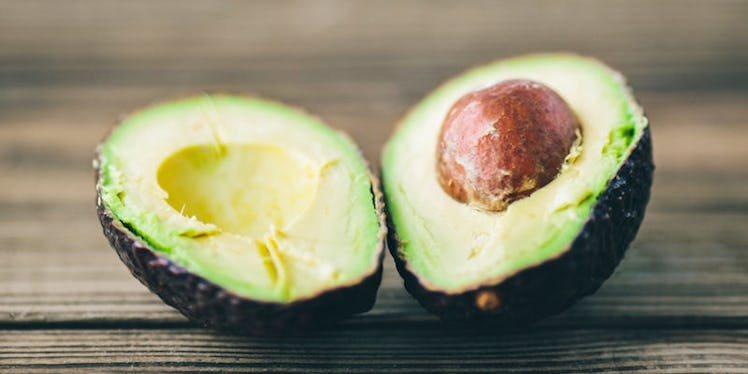All of us face the constant struggle of wanting to be healthy and fit, but also wanting to eat all the food that ever existed. It's a daily test of willpower that we all too often fail because, you know, cookies are life.
You want to have super flat abs and eat a salad, but you also want to consume a million doughnuts, you know?
Well, as it turns out, there are plenty of delicious, scrumptious foods that are actually healthful.
That's right.
Here are seven foods you thought were bad for you, but are actually good for you.
1. Coffee
Though you might equate coffee with feeling “jittery” and having “crashes,” this delicious liquid is actually good for you, science says!
Here's the deal: Researchers at Harvard University's School of Nutrition analyzed data from more than 200,000 men and women to determine whether increased coffee consumption actually led to better health outcomes. (This wasn't some quick study, either. According to the scientists, their analysis comprised "4,690,072 person-years of follow-up.")
After crunching the numbers, they found that, compared to non-drinkers, people who drank one to five cups of coffee per day had "a lower risk of mortality." They also didn't observe an increased risk of mortality for people who drank five or more cups per day.
Long, complicated story short: Enjoy that cup of coffee! Just remember to go light on the sugar, syrup and cream, as that can make a good drink go bad (for you). Also, stick to one or two cups a day to avoid that jittery feeling you can get from consuming too much caffeine.
2. Peanut butter
Though it might feel more like an indulgence than a healthful food, peanut butter is actually super good for you. (As long as you stick to the kind that doesn't contain added sugar.)
Yes, peanut butter is high in fat, but fat isn't always bad, according to Dr. Walter Willett, a professor of nutrition at Harvard University. He wrote in the Harvard Health Letter that a food's healthfulness depends on its balance of nutrients — not just its fat content.
According to Willett, there's strong scientific evidence showing that people who routinely consume nuts or peanut butter are less likely to develop type 2 diabetes and heart disease. What's more, apart from offering a mix of fiber, minerals and vitamins, peanut butter contains roughly the same ratio of unsaturated to saturated fat as olive oil. He stresses that ratio is important:
"In moderation, some saturated fat is okay. Eating a lot of it, though, promotes artery-clogging atherosclerosis, the process that underlies most cardiovascular disease. In contrast, unsaturated fats, which make up the majority of the fat content in peanut butter, help reduce LDL cholesterol and lower the risk of heart disease."
Yay peanut butter!
3. Bread
Even if you're not someone who likes to go heavy on the grains, it's helpful to remind yourself that not all breads are bad for you. Seriously, repeat after me: Carbs are not necessarily bad! You just need to opt for whole grains instead of their refined counterparts.
The key is choosing the right type of bread. You're going to want to skip white bread with a ton of sugar, but don't shy away from whole grains. Whole grains are good for your overall health and help to keep you energized for that workout you have planned for later.
4. Yogurt
Some people think that yogurt isn't healthful. And while yogurt with a ton of added sugar might not be, there are plenty of nutritional benefits associated with certain kinds of yogurt.
Researchers at Tufts University who study the health benefits of yogurt have found that people who regularly consume the delicious dairy treat are more likely to have lower blood pressure than their non-yogurt-eating counterparts.
Just make sure to buy yogurt with live cultures and not a lot of added sugar. You can mix it with fruit for breakfast, or you can use it as a replacement for sour cream in cooking.
5. Butter
According to a recent study published in PLOS ONE, diets low in fat might be doing more harm than good. That means all that butter you've been cutting out of your life for the past few years might not have been worth it!
While eating butter all day, every day is definitely not something you should aspire to, consuming it in moderation is probably okay. Butter's ratio of saturated to unsaturated fat may not be as optimal as olive oil's or peanut butter's, but this research suggests saturated fat is better for your health than processed carbohydrates like sugar.
6. Avocados
You can't go wrong with an avocado.
Avocados are basically nutritional gold. They're delicious. They're healthful. They're colorful. They're divine. They're amaze.
But don't just take it from me. Researchers have found that avocados are loaded with fiber as well as tons of nutrients and minerals that are good for your body.
Extra guac, please!
7. Chocolate
We're not saying you should go out and buy three candy bars now that we've stated that chocolate is good for you. And we're not not saying it either (JK LOL). Still, chocolate is definitely more than just a sweet.
When it comes to chocolate's nutritional benefits, it's all about the type of chocolate you eat. If you're looking for a healthful bang for your chocolate buck, then stick with dark chocolate, because the more cocoa the better! Varieties with a minimum of 70 percent cocoa content provide the most heart-healthy properties, science says. Just limit yourself to a few ounces of dark chocolate per day, and you'll be good to go.
